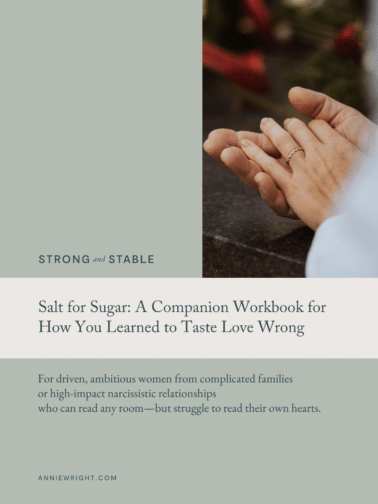TL;DR –The "Eternal Sunshine of the Spotless Mind" fantasy—erasing traumatic memories so they can't hurt you—represents what many trauma survivors secretly hope for, but successful recovery isn't about forgetting your past or never feeling pain about it again. Recovery doesn't mean forced forgiveness, becoming "one big happy family," dismissing your experiences to make others comfortable, or only feeling positive emotions while never wanting to numb out again. Instead, successful trauma recovery means being present while acknowledging the past happened, integrating experiences into a cohesive narrative, setting boundaries that keep you safe, developing a bigger toolbox for triggers, and building emotional resilience when shame or self-doubt arise.
True recovery involves moving toward healthy relationships, crafting an external life matching your internal truth regardless of family expectations, and increasing capacity to feel and express all emotions responsibly. The terms "successful" and "recovery" are deeply subjective—no one else can define what healing looks like for you. Clinical benchmarks include experiencing yourself as "presentified and personified" (knowing the trauma is over while you exist now), feeling more choiceful about symptom management, and having greater equanimity when triggered. Recovery isn't amnesia but integration—not erasing your heart's knowledge but learning to carry it with less suffering.
“You can erase someone from your mind. Getting them out of your heart is another story.” – Eternal Sunshine of the Spotless Mind
I love Kate Winslet.
Ever since 1997 when I was fifteen years old and watching Titanic in a movie theatre for the very first time, I’ve adored her and watched nearly everything she’s been in.
But one of her movies stands out above all others for me because of how often it’s referenced in my therapy work: Eternal Sunshine of the Spotless Mind.
This movie is evoked when folks tell me they hope for something ala what Clementine wanted. To erase the past from their memory so that the past no longer troubles them.
It’s a kind of Eternal Sunshine of the Spotless Mind fantasy. That we can just forget our past and it won’t rule us anymore.
It is, unfortunately, not possible, but still, that’s the secret hope and hidden fantasy of so many who arrive into my offices (and the offices of my team at my trauma-informed, boutique therapy center – Evergreen Counseling) when they start trauma therapy to recover from their adverse beginnings and painful early childhoods.
But recovery is not forgetting. It’s not amnesic.
Successful recovery from childhood trauma is possible, though. And so today’s essay will explore what successful recovery is, and is not. And paint a picture of the pathway to recovery if you yourself, like so many others, have an Eternal Sunshine of the Spotless Mind fantasy when it comes to your childhood.
“I will not stay, not ever again – in a room or conversation or relationship or institution that requires me to abandon myself.” ― Glennon Doyle, Untamed
First and foremost, it’s very important to understand and acknowledge that the terms “successful” and “recovery” are subjective terms. Meaning they will be unique and different for each individual.
There are many different ways of being brave. And your version of successful recovery may not look the same as mine (and vice versa).
So, as with finding our own version of bravery, when we align our internal truths to the external circumstances in our lives, that is the way we find and define subjective successful recovery.
What does successful recovery from childhood trauma look like?
Curious if you come from a relational trauma background?
Take this 5-minute, 25-question quiz to find out — and learn what to do next if you do.
START THE QUIZNo one is the expert of your experience but you and only you can define what successful recovery from your childhood trauma looks like.
But still, there are some clinical benchmarks I look for as a trauma therapist when supporting my clients to overcome their painful pasts. I’ll talk about these hallmarks more in a minute but first I want to expand on the subjective and personal importance of defining what successful recovery looks like by sharing what I think successful recovery does not look like.
Successful recovery from childhood trauma does not look like:
“In order to escape accountability for his crimes, the perpetrator does everything in his power to promote forgetting. If secrecy fails, the perpetrator attacks the credibility of his victim. If he cannot silence her absolutely, he tries to make sure no one listens.” ― Judith Lewis Herman
In my personal and professional experience, successful recovery from childhood trauma does not look like:
- Forgetting that the past ever happened (Eternal Sunshine fantasy.).
- Not having any feelings ever about the past or your abusers when you think about it/them.
- Forgiving your abusers (because you’re told and pressured that you need to do so to recover – if you choose to do so of your own volition, that’s different).
- Being “one big happy family again” so that you all can just “move on.” Your success in recovery is not dictated by whether or not you are in contact with your family of origin.
- Dismissing and diminishing your lived experiences and attendant feelings to make other people comfortable in order to preserve relationships with them.
- Living a “normal” life and engaging with the world in the way you are told you should do so.
- Never having the impulse to want to numb out, dissociate, or participate in former analgesic behaviors or substances.
- Never not feeling depressed, anxious, sad, and angry anymore – only feeling “good and positive” and “keeping things light.”
In my experience, it’s usually abusers or people who have a lot to gain from trauma victims not feeling their feelings about events who promulgate the aforementioned beliefs.
So if the above is what successful childhood trauma recovery does not look like, let me shed some light on what I, as a trauma clinician, think it does look like.
Successful recovery from childhood trauma does include:
“When women lose themselves, the world loses its way. We do not need more selfless women. What we need right now is more women who have detoxed themselves so completely from the world’s expectations that they are full of nothing but themselves. What we need are women who are full of themselves. A woman who is full of herself knows and trusts herself enough to say and do what must be done. She lets the rest burn.” ― Glennon Doyle
In my personal and professional experience, successful recovery from childhood trauma does include:
- Being able to experience yourself presentified and personified (being able to acknowledge you experienced the past events while existing in the here and now, realizing the events are over).
- Accepting (note: accepting only means acknowledging what is) and integrating the trauma experiences to form a cohesive narrative about your past experiences, how they impacted you, and feel developmentally appropriate feelings about what happened.
- Determining the boundaries – physical, emotional, mental, and logistical – that are best and right and true for you to help you feel safe, secure, and validated as you move through the world and move forward.
- Feeling more choiceful about the ways you manage the symptoms of your trauma history, having a bigger toolbox to manage the triggers that may occur.
- Feeling less disturbed, less flooded, and more emotional equanimity (over time) when presented with triggers that have historically been hard.
- Having greater resilience when triggers occur – specifically when shame, guilt, and self-doubt arise.
- Learning and re-learning what healthy, functional relationships look like and moving towards those.
- Moving towards crafting a life on the outside that matches who you are on the inside, regardless of what society and your family of origin would have preferred.
- Increasing your capacity to feel all of your feelings and expressing them in responsible, appropriate ways.
Defining Your Own Recovery Through Trauma-Informed Integration Therapy
When you tell your therapist you wish you could just erase your childhood memories like in Eternal Sunshine, you’re expressing the universal trauma survivor’s fantasy—but therapy helps you understand that while you can’t forget your past, learning what it means to create a beautiful adulthood for yourself requires integration, not amnesia.
Your trauma-informed therapist recognizes that recovery isn’t about achieving some universal benchmark—not forced forgiveness, not “moving on” to preserve family comfort, not becoming someone who never feels triggered. Instead, they help you define your own subjective version of healing based on your unique needs, values, and circumstances.
The therapeutic work involves developing what clinicians call “presentification”—acknowledging the trauma happened while knowing you’re safe now. Through narrative therapy, EMDR, or other approaches, you integrate fragmented memories into a coherent story that explains your responses without defining your future.
Your therapist supports you in expanding your toolbox for managing triggers, not eliminating them entirely. You practice feeling disturbed without being flooded, experiencing shame without drowning, having trauma responses while maintaining choice about your actions.
Most powerfully, integration therapy teaches that successful recovery means crafting an external life matching your internal truth, regardless of family expectations. Every boundary you set, every authentic choice you make, every feeling you allow yourself to express responsibly is recovery—not erasing your heart’s knowledge but transforming how you carry it.
And this list is just the tip of the iceberg.
Remember, the terms successful and recovery are subjective and the only person who can define your experience of successful recovery is you.
So to that end, I would love to hear from you in the comments below:
What is one story you were fed about what “successful recovery” would look like? And what is one way in which you personally define “successful recovery” for yourself? What one piece of advice and guidance would you give to someone who is just beginning their work to recover from adverse early beginnings?
If you feel so inclined, please leave a comment below so our community of 20,000+ blog readers can benefit from your wisdom.
Here’s to healing relational trauma and creating thriving lives on solid foundations.
Warmly,
Annie





